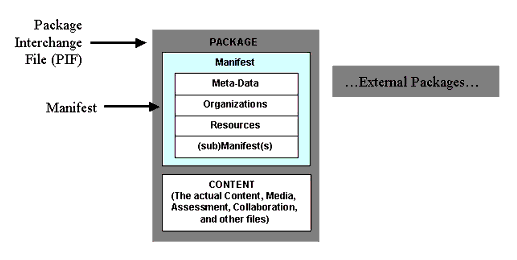IMS Content Packaging: Difference between revisions
Jump to navigation
Jump to search
(using an external editor) |
(using an external editor) |
||
| Line 2: | Line 2: | ||
IMS Content Packaging has the following objectives: | IMS Content Packaging has the following objectives: | ||
* allow | * allow transfer of [[e-learning]] contents from one system to an other (interoperability) | ||
* allow to import/export contents into/from a [learning management system]. Therefore also be able to use an | * allow to import/export contents into/from a [learning management system]. Therefore also be able to use an independent editing tool. | ||
* Content Packaging is an evolving standard. Make sure that you know what version you plan to build / import / export !! | * Content Packaging is an evolving standard. Make sure that you know what version you plan to build / import / export !! | ||
| Line 22: | Line 22: | ||
* The manifest can contain [[IMS Simple Sequencing]] instructions. | * The manifest can contain [[IMS Simple Sequencing]] instructions. | ||
* In more technical terms: The IMS Simple Sequencing binding defines a unique namespace for sequencing elements in such a way as to permit these elements to be embedded within an IMS Content Packaging manifest file. Elements in the Simple Sequencing namespace can be considered as extending the functionality of Content Packaging to included additional sequencing information. Simple Sequencing elements are intended to be included in the & | * In more technical terms: The IMS Simple Sequencing binding defines a unique namespace for sequencing elements in such a way as to permit these elements to be embedded within an IMS Content Packaging manifest file. Elements in the Simple Sequencing namespace can be considered as extending the functionality of Content Packaging to included additional sequencing information. Simple Sequencing elements are intended to be included in the <organization> element of Content Packaging, which contains items that may be recursively included to create hierarchical trees of items. This tree corresponds to the activity tree that drives sequencing. | ||
Here is a picture taken from the [[http://www.imsglobal.org/content/packaging/cpv1p1p4/imscp_bestv1p1p4.html IMS Content Packaging Best Practice and Implementation Guide Version 1.1.4]] of october 2004 that shows an overview of the Package Interchange File (PIF) architecture: | Here is a picture taken from the [[http://www.imsglobal.org/content/packaging/cpv1p1p4/imscp_bestv1p1p4.html IMS Content Packaging Best Practice and Implementation Guide Version 1.1.4]] of october 2004 that shows an overview of the Package Interchange File (PIF) architecture: | ||
Revision as of 14:39, 1 March 2006
Definition
IMS Content Packaging has the following objectives:
- allow transfer of e-learning contents from one system to an other (interoperability)
- allow to import/export contents into/from a [learning management system]. Therefore also be able to use an independent editing tool.
- Content Packaging is an evolving standard. Make sure that you know what version you plan to build / import / export !!
- IMS Content Packaging 1.1 is also part of ADL/SCORM 1.2 and 1.3 (2004)
- ToDo: Specify which minor versions 1.1.*
Package architecture
A Package Interchange File (PIF) contains:
- A zip file that contains various elements, e.g. HTML pages, pictures, Flash Animations, PPT (whatever, the idea is that you take formats that your client can handle)
- A special file in the zip is the "manifest" containing:
- a meta-data section
- a resource list (i.e. all the other files plus resources on the Net (URLs)
- an organizational section that describes the structure of how the elements can sequence.
- The manifest can contain IMS Simple Sequencing instructions.
- In more technical terms: The IMS Simple Sequencing binding defines a unique namespace for sequencing elements in such a way as to permit these elements to be embedded within an IMS Content Packaging manifest file. Elements in the Simple Sequencing namespace can be considered as extending the functionality of Content Packaging to included additional sequencing information. Simple Sequencing elements are intended to be included in the <organization> element of Content Packaging, which contains items that may be recursively included to create hierarchical trees of items. This tree corresponds to the activity tree that drives sequencing.
Here is a picture taken from the [IMS Content Packaging Best Practice and Implementation Guide Version 1.1.4] of october 2004 that shows an overview of the Package Interchange File (PIF) architecture:
Tools
Editors:
See also: Learning management systems.
